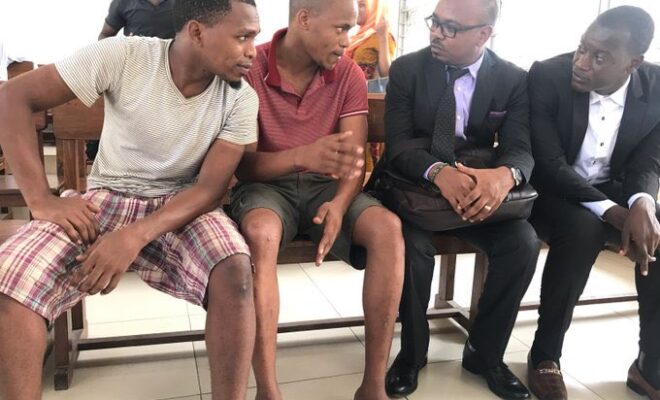FINALLY human rights activist, Tito Magoti alongside Theodory Giyan, now face three counts, including money laundering, at the Kisutu Resident Magistrate’s Court in Dar es Salaam, following their arrest about four days ago.
The arrest of Magoti, who works with the Legal and Human Rights Centre (LHRC), attracted public interest since then, with media eagerly following up on the matter from the Dar es Salaam Police Zone to find out reasons behind the arrest.
Pressure from human rights activists and opposition political parties mounted on social media led to the launching of an online campaign dubbed #FreeTito Magoti.
He was arrested four days ago when six men in plain clothes reportedly confronted the young lawyer shortly after getting off a motorcycle taxi (bodaboda), handcuffed and forced him into a car and disappeared with him.
According to the prosecution, the two accused persons, together with other people not in court, committed a money laundering crime between 1st February and 17th December this year, contrary to the Anti-Money Laundering Act, 2006, and the Economic and Organised Crimes Control Act of 2000.
During the mentioned period, at different places within Dar es Salaam, they allegedly acquired a total sum of money amounting to 17.35m/-while they knew that such money was proceeds of a predicate offence, namely leading organised crime .
The prosecution further alleged that Magoti and Giyan, will also have to answer charges of leading organised crime and possessing a computer programme designed for the purpose of committing an offence.
On organised crime, the prosecution alleges that the two committed a crime contrary to the Economic and Organised Crimes Control Acts of 2002 as amended.
The prosecution further alleged that on separate dates between 1st February and 17 December this year, at different places in Dar es Salaam Region Magoti and Giyan together with other persons not in court, willfully organised a criminal racket for possessing a computer program that was designed for the purpose of committing an offence.
The programme, according to the prosecution, enabled the accused to acquire a sum of money amounting to 17.35m/-.
The prosecution alleged that possession of such a computer program was an offence and was against the Cyber Crimes Act and the Economic and Organised Crimes Control Act of 2002 as amended.







